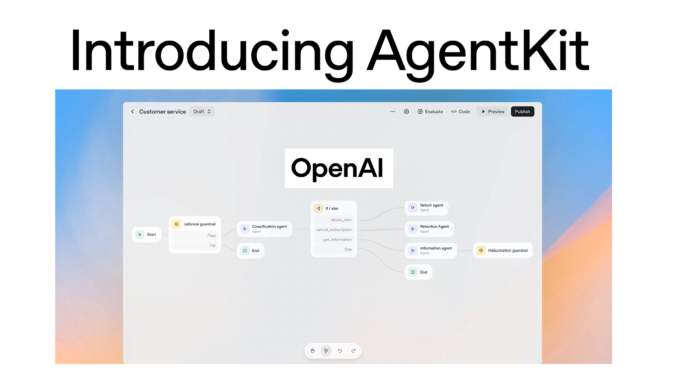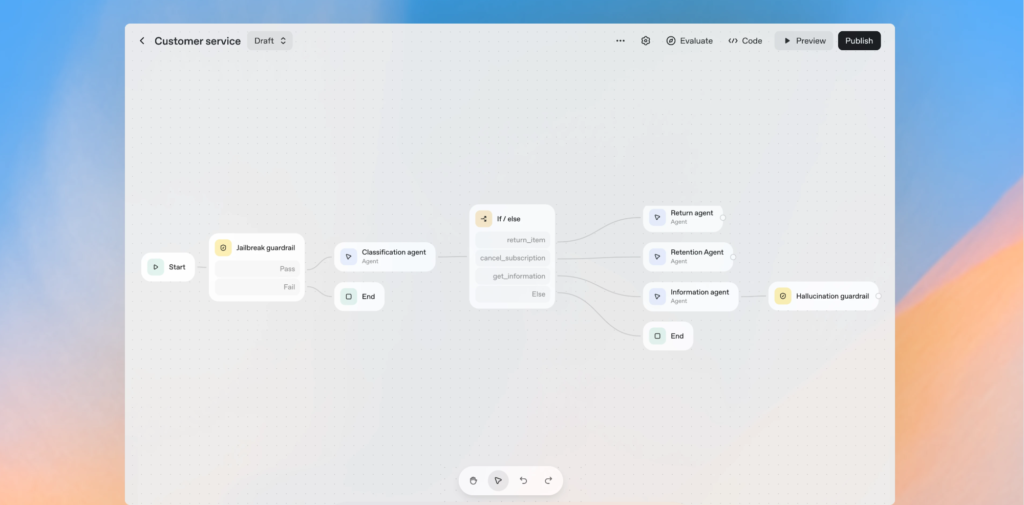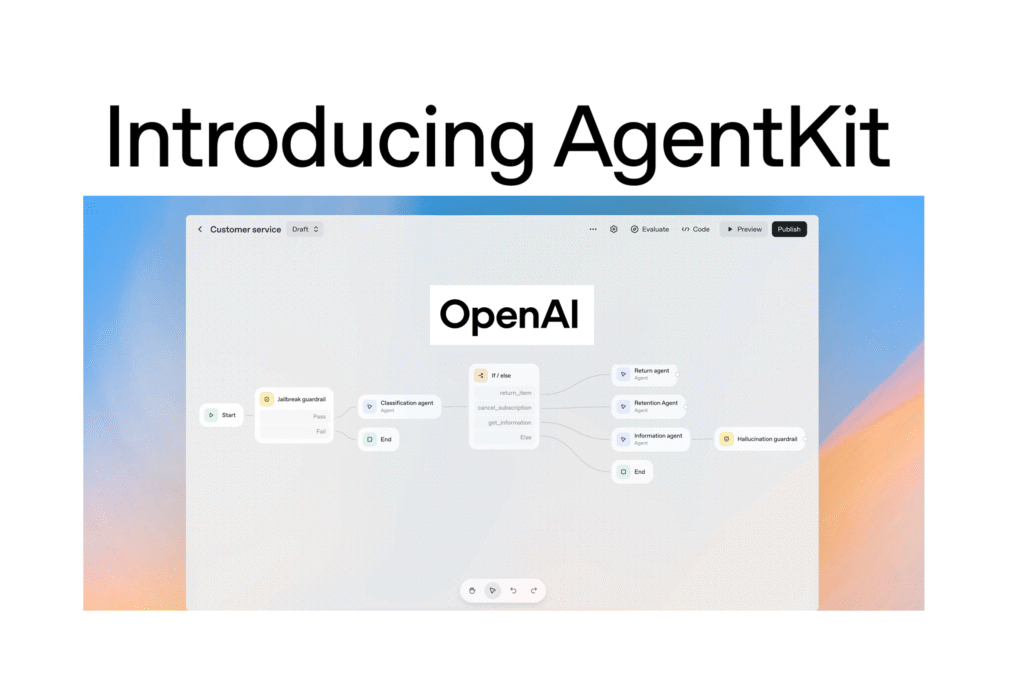
LLM pioneer OpenAI has launched AgentKit, which uses a visual canvas and building block approach to improve agent creation and deployment. In turn this should help legal tech companies to more easily leverage this approach to automating workflows.
The California-based company, which now has a $500 billion valuation even though ChatGPT only launched less than three years ago, said that AgentKit would provide a ‘complete set of tools to build, deploy, and optimize agents’.
In a nutshell the goal is to simplify the creation of agents so that more people can see the benefits – and that is dependent on developers, including at legal tech companies (or at law firms and inhouse teams), becoming more fluent in designing, evaluating and improving them.

As noted, central to this is the new building block approach, which means ‘developers can now design workflows visually and embed agentic UIs faster’. This includes:
‘Agent Builder: a visual canvas for creating and versioning multi-agent workflows
Connector Registry: a central place for admins to manage how data and tools connect across OpenAI products
ChatKit: a toolkit for embedding customizable chat-based agent experiences in your product.’
–

–
Another key area is improvements in measuring agent performance with new Evals capabilities. As they explain: ‘Building reliable, production-ready agents requires rigorous performance evaluations. Last year, we launched Evals to help developers test prompts and measure model behaviour. We’re now adding four new capabilities that make it even easier to build evals:
‘Datasets–rapidly build agent evals from scratch and expand them over time with automated graders and human annotations..
Trace grading–run end-to-end assessments of agentic workflows and automate grading to pinpoint shortcomings.
Automated prompt optimization–generate improved prompts based on human annotations and grader outputs.
Third-party model support–evaluate models from other providers within the OpenAI Evals platform.’
Is this a big deal? Well, yes….if the goal here is to really try and automate whole streams of legal work, which simple prompts or info searches cannot achieve alone.
But, agents are already in the market, or at least some early version of agentic tools are. What is the big deal here? The answer is that what most ‘agentic’ systems are doing now is very limited, in fact, as Jake Jones at Flank has argued, many agents in the legal sector are really just simple automated workflows that don’t operate with reasoning. Moreover, they are often very limited in scope.
As is very clear to all, legal work is highly complex and has many moving parts, and often multiple data streams are needed to be fed into any task. In short, it all needs orchestration, which itself is a complex task. That is done now by humans. But, agents are automators….i.e. they automate a workflow, they are not assistants as such. But, to make them truly useful they need plenty of design. And design is difficult. AgentKit seeks to make it much easier.
Or, as OpenAI explained: ‘As agent workflows grow more complex, developers need clearer visibility into how they work. Agent Builder provides a visual canvas for composing logic with drag-and-drop nodes, connecting tools, and configuring custom guardrails. It supports preview runs, inline eval configuration, and full versioning – ideal for fast iteration.’
‘Builders can get started with a blank canvas or with prebuilt templates,’ they added.
The fast iteration aspect is also key, as agents are not much use if they are not accurate. Faulty workflows just compound errors, so having a way to quickly and easily evaluate and then correct, is going to be vital.
Another key point, noted above, is access to data. Agents don’t operate in a vacuum. They need to tap data sources and extract information. Perhaps that extraction is the end goal, or in more complex systems that data is leveraged for a different outcome further down the workflow.
To that end OpenAI is ‘also launching a Connector Registry for enterprises to govern and maintain data across multiple workspaces and organizations. The Connector Registry consolidates data sources into a single admin panel across ChatGPT and the API. The registry includes all pre-built connectors like Dropbox, Google Drive, Sharepoint, and Microsoft Teams, as well as third-party MCPs.’
And on the UI/UX side of things they are adding ‘ChatKit, [which] makes it simple to embed chat-based agents that feel native to your product. It can be embedded into apps or websites and customized to match your theme or brand.’
That’s especially interesting for legal tech companies as they can perhaps build more easy to use agent interfaces so that lawyers can tap agentic workflows within a product. In fact, if this turns out to be really user-friendly, then law firms and legal teams inhouse may find they can do some agentic DIY tool development themselves.
Overall, this reflects a direction of travel we have seen in a lot of software over the last few decades: what starts off as esoteric, code-heavy and complex, eventually evolves into something that is a lot more intuitive and easier to use. In turn that usually leads to a rapid increase in the use of such features.
Of course, making it easier to build agents is only a positive thing if they can also be made to operate accurately. Loads of duff agents making a glorious mess is not helpful. But, if – as alluded to above – they can be evaluated and improved more easily and quickly, then we could witness a real step change in how widely agents are used in the legal sector.
More here.
—
Legal Innovators Conferences in London and New York – November ’25
If you’d like to stay ahead of the legal AI curve then come along to Legal Innovators New York, Nov 19 + 20 and also, Legal Innovators UK – Nov 4 + 5 + 6, where the brightest minds will be sharing their insights on where we are now and where we are heading.
Legal Innovators UK arrives first, with: Law Firm Day on Nov 4th, then Inhouse Day, on the 5th, and then our new Litigation Day on the 6th.


Both events, as always, are organised by the Cosmonauts team!
Please get in contact with them if you’d like to take part.
Discover more from Artificial Lawyer
Subscribe to get the latest posts sent to your email.

